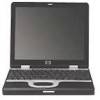HP Nc4010 Software Guide - Page 90
Roxio Easy CD and DVD Creator, Quick Launch Button software
 |
View all HP Nc4010 manuals
Add to My Manuals
Save this manual to your list of manuals |
Page 90 highlights
Index enabling USB legacy support 7-6 identification information 7-3 MultiBoot 5-2 power source 2-1 using presentation mode with 6-1 power default settings 2-5 management options 2-8 schemes 2-9 sources 2-1 uncertain supply 2-4 power conservation Hibernation 2-3 processor performance controls 2-10 Power Meter icon 2-9 presentation mode Quick Launch button 6-2 settings 6-3 using 6-3 processor performance controls 2-10 protecting notebook from power surges 1-5 from viruses 1-5 PXE (Preboot eXecution Environment) protocol 5-3 Q Quick Launch Button software opening 6-2 settings 6-3 R RAM (random access memory) and Standby 2-2 region settings for DVDs 4-16 regional settings 1-3 resuming from Hibernation 2-6 resuming from Standby 2-7 ROM. See system ROM (Read Only Memory) ROMPaq 8-3 Roxio Easy CD and DVD Creator Drag-to-Disc 4-9 preparing to use 4-11, 4-15 settings 4-13 RPL (Remote Program Load) protocol 5-3 S safeguarding data 8-6 screen settings 1-3 security features device disabling 3-15 HP Administrator password 3-9 setting up software 1-1 shutting down the notebook 2-5 SoftPaq 8-3 software antivirus 1-5 optical drive 4-3 setting up 1-1 Software Setup utility 1-2 space requirements 1-2 UDF Reader 4-5 Index-4 Software Guide











